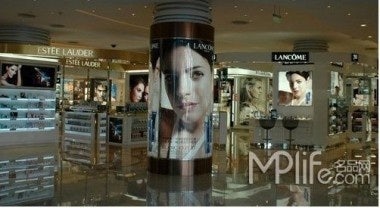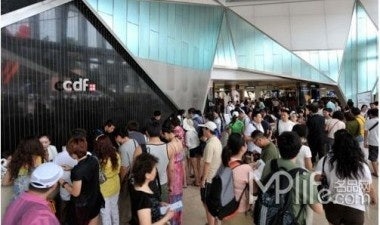Hainan Tourism Authorities Shouldn't Rely Too Much On New Program#

Hainan duty-free store (mplife.com)
Recently, Jing Daily reported on Hainan island's new tax incentive program, which tourism authorities ushered in this January to provide tax refunds for purchases made by foreign tourists. In the months since enacting the foreign tourist-focused program, Hainan officials recently launched a pilot off-shore duty-free program aiming to boost high-end shopping and expand consumption demand among mainland Chinese tourists.
This program, which officially launched last month, allows Chinese tourists to claim tax refunds on imported luxury items purchased in Hainan up to a value of 5,000 yuan (US$762), with reduced tax rates for purchases exceeding 5,000 yuan. In an attempt to transfer Hainan's tourism offerings from “3S” (sun, sand, sea) to “4S” (sun, sand, sea, shopping), the program uses a novel payment model at duty-free stores.
From our coverage of the pilot program:
When purchasing items, tourists need to show valid ID, accurate information on their return flights and information about their previous duty-free purchases. After they’ve paid, the tourists won’t get their items immediately, as they need to be wrapped up and transported to Sanya Phoenix International Airport, where the tourists can pick them up. The tax exemption program only applies to tourists 18 years of age or older, who will fly to other domestic destinations in China and who have purchased goods worth no more than 5,000 yuan each. The program also applies to residents of Hainan.
Each eligible non-resident tourist can claim tax rebates twice a year, and Hainan residents can enjoy the privilege once a year. If tourists pay the full import tax, tourists can buy items priced at more than 5,000 yuan.

People crowd at Hainan's new duty-free store (Image: Mplife.com)
So how has the pilot program panned out since kicking off in April? Fairly well, but not overwhelmingly so, it seems. According toChina Daily, around 14,000 customers visited Sanya's new 7,000 square meter duty-free shop on its opening day, with staff accommodating 16 large tourists groups at one time. As one tourist from Jiangxi Province said as crowds amassed outside the store, "I was in Hong Kong when I heard the news that duty-free shopping was going to be launched here, so I didn't buy any luxury goods there."
While early signs indicate that the tax refund program is increasing luxury purchases on the island, the scheme may come up against challenges and limitations. As some visitors pointed out during Golden Week, the recent three-day holiday celebrating Labor Day in China, Hainan's tax incentive program seems more "superficial" than substantive. From People's Daily(translation by Jing Daily team):
It is difficult for tourists to buy cheap luxury goods in duty-free stores. Virtually no items priced at less than 500 yuan (US$77) are in stock. Some tourists had no choice but to purchase lesser-known cosmetics since most of the well-known brands were out of stock. However, even the prices of these lesser-known cosmetics were priced higher at duty-free stores than at common supermarkets. As a result, cheap items sold out quickly and left shoppers with only sky-high priced items. Many tourists walked out empty-handed.
In addition, the delivery of purchased goods is a big issue. [Under the new Hainan program,] tourists have to pick up their purchased items at the airport, and make sure they will don't miss their return flights. As a result, tourists have to arrive at Kaikou Meilan International Airport at least four hours before departure. For some tourists, time is more important than money, so they may not be willing to stand in a long line just to get relatively cheap goods, since the savings are not so obvious.
Nowadays, tourists buying items during their trips aren't only interested in getting tax rebates, since many tourists actually pay attention to value and a good shopping environment. However, as other places are likely to imitate Hainan's duty-free policy in the future, and Hainan's allure mostly comes down to its scenic beauty rather than its shopping, the tax refund program is unlikely to be considered a major draw for the island.
People's Daily isn't the only newspaper in China critical of Hainan's program. This week, an article from Guangxi Province's Nan Guo Morning News (南国早报) notes that residents of Nanning, the provincial capital, are less than thrilled about the program, owing mostly to te lack of direct flights from Nanning to Sanya. More interestingly, Nanning travel agencies aren't advertising Hainan's duty-free scheme. However, this may have more to do with the proximity of Guangxi (which neighbors Guangdong province) to Hong Kong. As one local resident sniffed, "Why do we need to go shopping in Hainan? The duty-free policy in Hong Kong is more mature, so why don't we just go to Hong Kong?" Residents of wealthy Guangdong province, particularly the luxury-obsessed in top-tier city Guangzhou, are also unlikely to give up their regular shopping trips to Hong Kong. As the English-language news portal Want China Times pointed out recently, the future of Hainan's duty-free shops might not be guaranteed:
Although Hainan is close to Guangdong Province, most of Guangdong's wealthier residents prefer to travel to and shop in Hong Kong. Hong Kong is preferred because it is closer and many shoppers feel the former British colony has an exotic environment which makes them feel like they are shopping abroad.
As Jing Daily has previously noted, mainland Chinese tourists often prefer to purchase luxury items abroad since they feel the goods make more presentable gifts and overseas shops have wider selections. While these are questionable reasons, particularly as more brands are stocking their full inventories in mainland China in an attempt to get more shoppers to buy locally, one benefit of shopping outside of the mainland that is indisputable is avoiding China's stiff luxury taxes.
While the long-term potential of its tax incentive program is questionable, Hainan island may have a lead on potential rivals due to its early moves to branch into duty-free luxury retail. While other cities, such as Shanghai, are planning duty-free districts, Hainan's status as a "green tourism" draw will ensure its duty-free program is an additional benefit, rather than something to rely upon for tourism revenue. But if Hainan's program is ever truly to succeed, its architects need to figure out a better way to cater to consumer preferences, improve its shopping environments, increase product lines and store inventory, streamline logistics, and enhance customer service capabilities.